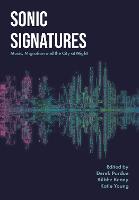|
books
| book details |
Sonic Signatures: Music, Migration and the City at Night
Edited by Derek Pardue, Edited by Ailbhe Kenny, Edited by Katie Young

|
This book is currently unavailable. Enquire to check if we can source a used copy
|
| book description |
Sonic Signatures is an interdisciplinary collaboration of scholars and music-makers who come together to explore how music makes cities. More specifically, they argue that the musical encounter, composed of an array of production and consumption practices, takes on particular and essential meaning at night. Thinking about music as an encounter allows one to appreciate the value and power of migration within the act of music-making. The majority of voices amplified in the book come from so-called “migrants,†understood as someone who was born in one country and currently lives and works in another. Yet, these words, migration, migrant and migrancy, are more expansive than that as they indicate a range of movement, politics and place-making. Contributions from Emilie Amrein, André de Quadros, Nick Dunn, Pol Esteve, Jillian Fulton-Melanson, Jacqueline Georgis, Masimba Hwati, Ailbhe Kenny, Seger Kersbergen, Brendan Kibbee, Ãine Mangaoang, Derek Pardue, Nick Prior, Austin T. Richie, Willians Santos, Sipho Sithole, Gibran Teixeira Braga, Katie Young. A great, engaging transdisciplinary contribution to nightlife studies, music and the city.
| product details |
Normally shipped |
Publisher | Intellect
Published date | 24 May 2023
Language |
Format | Digital download
Pages | 0
Dimensions | 0 x 0 x 0mm (L x W x H)
Weight | 0g
ISBN | 978-1-7893-8698-1
Readership Age |
BISAC | music / instruction & study / theory
| other options |
|